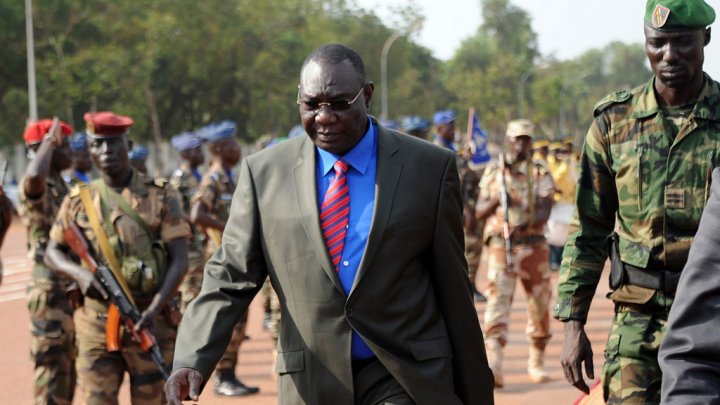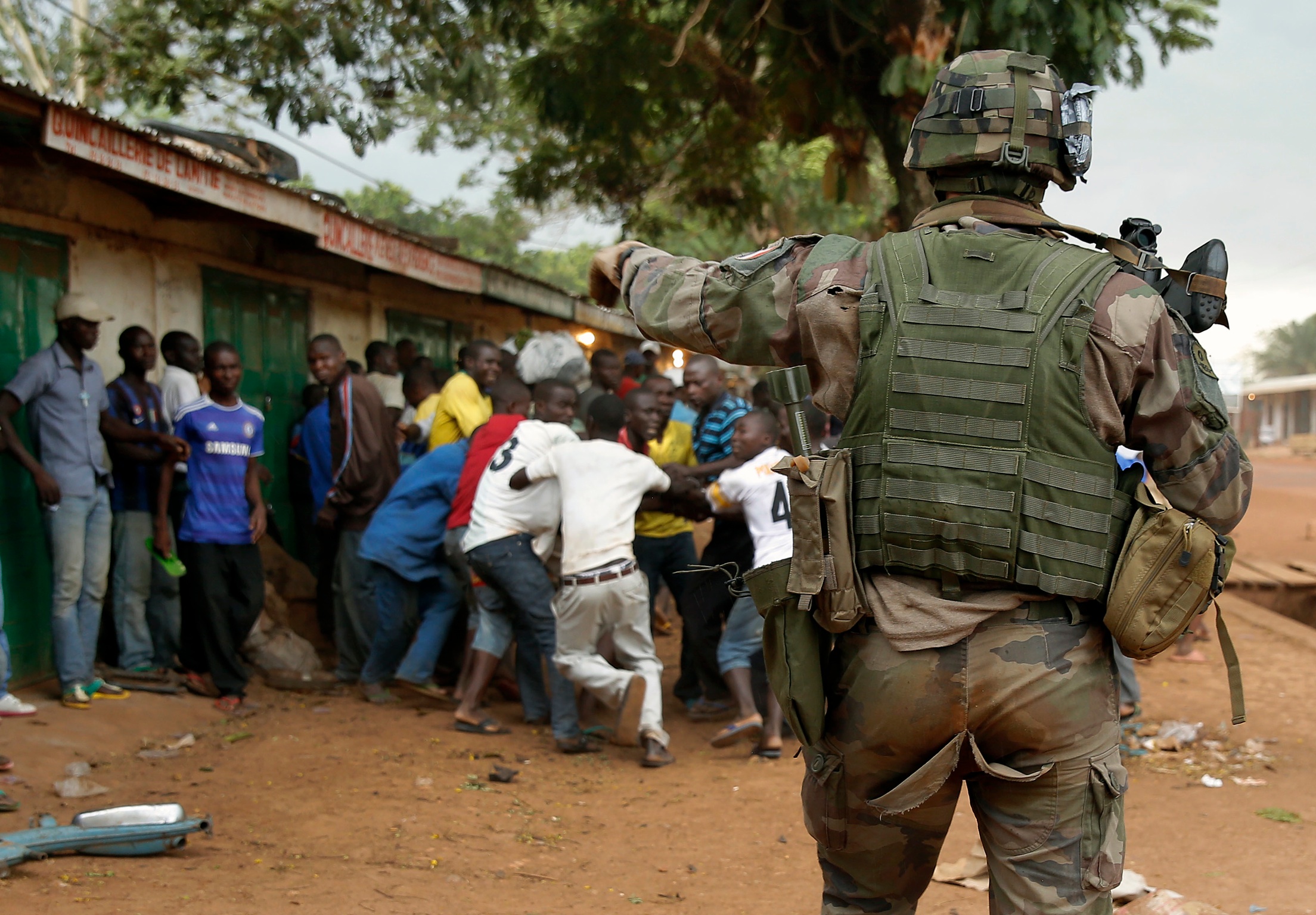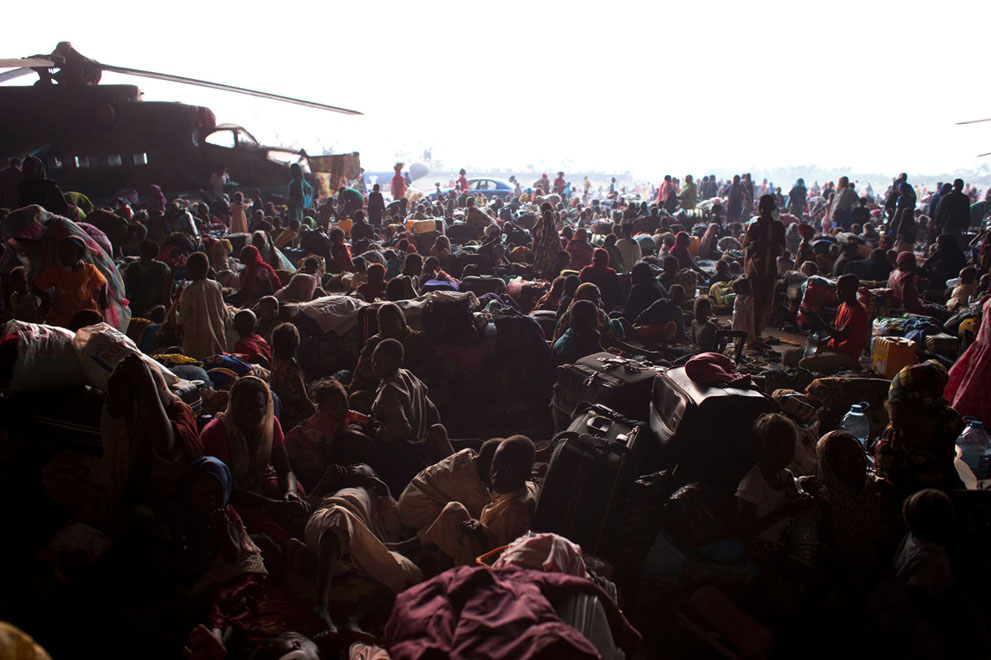www.aljazeerah.info
News, January 2014
Archives
Mission & Name
Conflict Terminology
Editorials
Gaza Holocaust
Gulf War
Isdood
Islam
News
News Photos
Opinion Editorials
US Foreign Policy (Dr. El-Najjar's Articles)
www.aljazeerah.info
|
Editorial Note: The following news reports are summaries from original sources. They may also include corrections of Arabic names and political terminology. Comments are in parentheses. |
First Muslim President of Diamond-Rich Central African Republic, Michel Djotodia, Forced to Resign Under Pressure by France and its Puppets, Attacks on Muslims Continue
January 12, 2014
Related articles:
French Government Bans Shows of Comedian Dieudonne M'bala M'bala While Allowing Islamophobia
French Government Bans Shows of Comedian Dieudonne M'bala M'bala While
Allowing Islamophobia
 |
 |
 |
 |
 |
 |
|
First Muslim President of Diamond-Rich Central African Republic, Michel Djotodia, Forced to Resign Under Pressure by France and its Puppets, While Attacks on Muslims Continue in the Country |
Former CAR president Djotodia seeks exile in Benin
France 24, AFP, 2014-01-12
Michel Djotodia, who resigned as interim president of the Central African Republic on Friday after months of sectarian violence, has sought exile in Benin, according to Chadian and Beninese officials.
Djotodia resigned along with his prime minister under intense international pressure after they failed to halt months of inter-religious violence, displacing nearly a million people from their homes.
Government sources in both Chad and Benin on Saturday said Djotodia would go into exile in Benin, where he arrived in an official Chadian plane on Saturday.
He was met at the airport by Benin's Foreign Minister, Nassirou Bako Arifari, who earlier in the day had confirmed that his country had agreed to host Djotodia at the request of central African states.
Djotodia and Arifari shook hands but the former head of state, in casual clothes and looking relaxed, made no comment to waiting journalists.
His choice of refuge is unsurprising: Djotodia spent several years there during the last decade of turmoil and has family in the West African nation.
Thousands of people on Friday took to the streets of Bangui, the country's crumbling riverside capital, to celebrate the departure of Djotodia, who was swept to power by mainly Muslim rebels, known as Seleka, last March.
The creation of Christian (anti-balaka) militia (led to) killings that evoked memories of Rwanda's genocide 20 years ago.
Joy gave way to violence late on Friday and African and French peacekeepers reported overnight clashes between Seleka fighters and the Christian militia in Bangui.
"But I can confirm that a good part of the shooting was warning shots from us to disperse looters who were targeting Muslim homes and shops," an officer in the African peacekeeping mission said, asking not to be named.
Former colonial power France, which had sought to stay out of the latest crisis in a country where it has often intervened, dispatched hundreds of soldiers last month to bolster a beleaguered African peacekeeping force as killings spiraled.
Yet violence has continued, killing 1,000 in December. French and Chadian troops were among the victims and international pressure mounted on Djotodia to step aside at an emergency summit hosted by neighboring Chad this week.
Alexandre-Ferdinand Nguendet, the head of Central African Republic's (CAR) transitional assembly (CNT), is officially in charge of the country until the body can select a new leader to guide CAR to elections, which are due later this year.
While Djotodia went into exile, Nguendet and other Central African politicians returned to Bangui where, even with 1,600 French and some 4,000 African peacekeepers on the ground, security is precarious.
The International Organisation for Migration on Saturday began airlifting stranded foreigners out of the country, where 60,000 people from neighboring countries have asked to leave.
Some 27,000 people, mainly from Mali, Senegal, Niger and Chad, have already been evacuated by their governments.
Tensions are running high among those who will remain.
(FRANCE 24 with AFP, REUTERS)
Date created : 2014-01-11
Celebrations in Bangui after CAR president’s resignation
AFP, by James ANDRE
Text by FRANCE 24, 2014-01-11
Thousands of people celebrated in the streets of Bangui on Friday following the double resignation of the Central African Republic’s Interim President Michel Djotodia and Prime Minister Nicolas Tiengaye.
Under intense diplomatic pressure, Michel Djotodia stepped down on Friday during a special regional summit in Chad, which called his move a "highly patriotic decision".
Djotodia had come under fire for failing to rein in the mainly Muslim rebels who brought him to power in March 2013 and whose (claimed) abuses triggered retaliatory violence by Christian militias.
In the capital Bangui, news of the double resignation was greeted with joy, with thousands of people descending on the streets, shouting "it's over, it's over".
Ten months of violence have displaced a fifth of the country's population and the sectarian flare-up has killed more than 1,000 people in the past month alone, despite former colonial power France's military intervention.
Elsewhere in Bangui, there were reports of looting following the resignation announcement, with at least two people suffering gunshot wounds during raids on neighbourhood stores.
Djotodia, whose Seleka rebellion descended on Bangui from the Chadian border in late 2012, became the Christian majority nation's first Muslim president last year.
He struggled, like many of his predecessors, to extend any real influence beyond the capital but Bangui's Muslims fear his resignation may egg on vengeful Christians.
"There are whispers, rumours. I've heard we are going to be attacked when Djotodia steps down," a young Muslim salesman who gave his name as Osmane told AFP.
Djotodia successor to be chosen Monday
UN Secretary General Ban Ki-moon called on the African Union to speedily provide promised troops to help curb the "terrible crisis" in the CAR.
France has deployed 1,600 troops in the country to support the African Union MISCA force, which is meant to have up to 6,000 troops but has not yet reached 3,500.
European nations on Friday agreed in principle on a plan to launch a joint military operation in the country, with a final decision expected on January 20, an EU source said.
Candidates to replace Djotodia have yet to emerge, but the interim parliament is due to hold a special session Monday.
French Defence Minister Jean-Yves Le Drian urged lawmakers to decide "as soon as possible".
Chad is seen as having more than tacitly backed Djotodia's coup but, true to its reputation as the kingmaker of Bangui politics, it moved to sideline him when he failed to deliver.
All 135 Central African lawmakers were flown to the summit of the regional ECCAS grouping on Thursday at the behest of Chadian President Idriss Deby Itno.
(Editor's Note: Idriss Deby made the resources of his country, Chad, available to the French troops invading Mali).
CAR president resigns amid inter-religious violence
France 24, AFP, 2014-01-10
Interim President Michel Djotodia and Prime Minister Nicolas Tiengaye of the Central African Republic have resigned, according to a statement issued as regional leaders wrapped up a two-day summit in Chad’s capital N’Djamena.
Talks to decide on a new leadership will take place in the Central African Republic’s capital Bangui at a later date, said the statement from the Economic Community of Central African States (CEEAC).
Djotodia had been facing growing pressure to step down over his failure to end weeks of inter-religious violence in his country.
Thousands of Central Africans took to the streets of the Bangui on Friday, demanding that Djotodia stand down. As the news from the summit reached the capital, crowds of demonstrators began to celebrate.
"Finally we are free! We are going to return home at last,'' said Carine Gbegbe, who has been living in a displacement camp on the southern outskirts of the capital.
The country descended into chaos after Djotodia’s Seleka rebels deposed president François Bozizé in a March coup. Djotodia officially disbanded the mainly Muslim rebel group after he seized power.
Amnesty International says more than 1,000 people were killed in just a couple of days in early December, mostly by Muslim ex-rebels but also in reprisal attacks by Christians.
France has deployed 1,600 troops to support the UN-backed MISCA (African-led International Support Mission to the Central African Republic) peacekeeping mission.
Nearly a million people have since fled the inter-religious strife that has left hundreds dead.
An estimated 100,000 people alone have sought shelter at the airport, which is being guarded by French troops.
(FRANCE 24 with AFP, REUTERS)
Malian Muslims flee Central Africa violence
FRANCE 24 with AFP, 2014-01-07
A month after French and African Union troops intervened in the Central African Republic (CAR), around a million refugees have fled inter-religious violence in the fragile and poverty-stricken country. FRANCE 24 reports from Bangui.
The United Nations estimates that half the residents of Bangui have fled their homes.
The CAR, already chronically unstable, plunged into chaos after mainly Muslim Seleka rebels staged a coup last March.
The French-led military intervention came amid resurging violence pitting former rebels against militias from the country's Christian majority bolstered by fighters loyal to the ousted regime.
FRANCE 24 joined a convoy of ethnic Malians -- all Muslims -- heading to the airport in Bangui, where up to 100,000 people are sheltering from the rampaging militias.
"It's not just the Malians, all the Muslims are being attacked,” one refugee, who gave her name as Mbou, said. “The Senegalese have already left; the Chadians, the Cameroonians, and the Nigerians as well.
In all, some 500 Malians are due to leave the city on two flights this week. Most of them have never left the Central African Republic and are leaving everything behind.
"I lost my son in law,” Toure told FRANCE 24. “The Anti-Balaka [Christian militias] cut him to bits, he is dead now."
The number of displaced people in Bangui increased 70 percent during December, from 214,000 to 370,000, according to the UN Office for the Coordination of Humanitarian Affairs.
"The humanitarian situation in the Central African Republic remains dire, as insecurity is making the delivery of humanitarian relief ever more difficult and as the number of people displaced within the country has now surpassed 935,000," Babar Baloch, spokesman for the UN High Commissioner for Refugees, said on Friday.
The CAR has a population of around 4.5 million.
A total of 1,600 French troops and around 4,000 African peacekeepers are attempting to rein in the militias and bring some order and security.
Date created : 2014-01-06
Christian mobs attack Muslims in Central African Republic
By Associated Press
December 9, 2013 | 3:12pm
BANGUI, Central African Republic —
Dozens of young men stood waiting for storm clouds to pass, as wind stirred up swirls of red dust on the largely deserted street in Central African Republic’s capital. Through the drizzle, they spotted a man in a flowing white robe traditionally worn by Muslims, hand-in-hand with his adolescent son.
The style of dress was enough to confirm that this was their enemy.
Hungry for revenge, the crowd descended upon the pair. The man’s terrified son broke away, and fled on foot, abandoning his father as the knife-wielding mob clutched the middle-aged man.
Muslim rebels known as Seleka overthrew the government of this majority Christian nation nine months ago, sparking mounting sectarian violence that prompted former colonizer France last week to deploy troops to Bangui in an effort to stop the bloodshed.
In a city where more than 400 people died last week in two days of tit-for-tat violence between Christians and Muslims, it was clear Monday there is still enough pent-up rage left that a crowd will try to kill a man on sight.
The angry mob insisted their victim served as a general in the rebel movement accused of carrying out atrocities against the nation’s Christian population, including tying victims together and throwing them off bridges to drown. “Seleka! Seleka! Seleka!” screamed the men as they encircled the Muslim man in a tornado of anger.
In this case, French forces intervened just in time, firing into the air as a warning. “I am a merchant! I am a merchant!,” the man cried as the French pulled him away, his back covered in dirt and his gown ripped off. His tearful son came back, his white shirt covered in blood, and the French ferried them to safety.
Other Muslims were not as fortunate. In the Benzvi neighborhood, a mob descended upon two ex-Seleka leaders leaving their home Monday afternoon. One got away. The crowd took up the only weapons they had against the other, witnesses said.
“People picked up rocks from the ground and stoned him to death,” said Junior Dagdag, 28, pointing to the pool of blood and stones in the middle of the road, where the victim’s car burned and smoke plumed into the sky. “Some brought his body to the hospital while others set his car on fire.”
The latest round of violence began Thursday, when armed Christian fighters who oppose the ex-Seleka forces in power attacked the capital and were later repelled by the ex-rebels.
Already 1,600 French forces are on the ground. French helicopters buzzed overhead while dozens of military vehicles, including armored personnel carriers, snaked through neighborhoods where tensions ran high. French forces came under attack near the airport but the area was later secured.
President Michel Djotodia had demanded that the fighters who brought him to power remain in their barracks Monday so that French forces and African troops from a regional peacekeeping mission could secure the city. Fed-up Christians sought to enforce the law themselves, chasing anyone they suspected as being part of Seleka – even in civilian clothing – off of the streets.
Emmanuel Yakanga, 53, a Christian, said he walked by a group of Christians harassing some men they accused of being Seleka and that he understands their anger. Even as ex-Seleka elements promised to disarm and hand over their weapons to the French, Christian neighborhoods are coming under attack nightly, he said. Yakanga’s 17-year-old niece was fatally shot on Thursday, he said.
“This talk of disarmament is merely superficial. They’re just going to keep their weapons elsewhere,” Yakanga said of the ex-Seleka.
In the months since he seized power, it has become clear that Djotodia wields little control over the rebels who now see themselves as the country’s national army. Over the weekend, Djotodia acknowledged his lack of power, telling reporters that not even “an angel from the sky” could govern his troubled nation now.
Central African Republic has suffered decades of dictatorship, coups, and rebellions that have kept the diamond-rich country in many ways frozen in time since its independence from France in 1960. Life expectancy was a mere 48 years even before the latest humanitarian crisis, and aid officials warn an untold number of people forced to flee deep into the bush are dying of malaria and other illnesses.
The latest spasm of violence, however, is horrific even by the standards of the broken nation.
As Muslims came under attack across the city, a Christian man in another part of the capital nearly lost his life to a fearful and angry Muslim mob.
Crowds said they spotted Sincere Banyodi, 32, as he made his way through the Kokoro 3 neighborhood and feared he was a member of the Christian militia known as anti-balaka, which has carried out massacres of Muslim civilians.
“This guy was walking through our neighborhood with two grenades. We asked him where he was from and he couldn’t tell us. The people caught him and attacked him, but then decided to turn him over to the French instead of killing him,” said Ali Moussa Terab, who was standing in the crowd.
Banyodi, who was identified by a friend, sat with pieces of cloth tied around his machete wounds on both arms, his pants soaked in blood. He said nothing, not responding to questions as he sat alone in front of a cluster of shops. Half a dozen armed French forces kept the large crowd swirling nearby at bay.
Even as French troops patrolled, some residents said they doubted the intervention would hold. Muslim resident Abdel Wahid, 32, and his friends said they heard rumors the Christian militia fighters were regrouping in the countryside. Despite the clear danger on the streets, they said, this was the calm before the storm.
“Why should Seleka have to turn over their weapons? They are the national army,” Wahid said. “After the French leave, things will explode.”
Fair Use Notice
This site contains copyrighted material the
use of which has not always been specifically authorized by the copyright
owner. We are making such material available in our efforts to advance
understanding of environmental, political, human rights, economic,
democracy, scientific, and social justice issues, etc. We believe this
constitutes a 'fair use' of any such copyrighted material as provided for
in section 107 of the US Copyright Law. In accordance with Title 17 U.S.C.
Section 107, the material on this site is
distributed without profit to those
who have expressed a prior interest in receiving the included information
for research and educational purposes. For more information go to: http://www.law.cornell.edu/uscode/17/107.shtml.
If you wish to use copyrighted material from this site for purposes of
your own that go beyond 'fair use', you must obtain permission from the
copyright owner.
|
|
|
|
||
|
||||||


